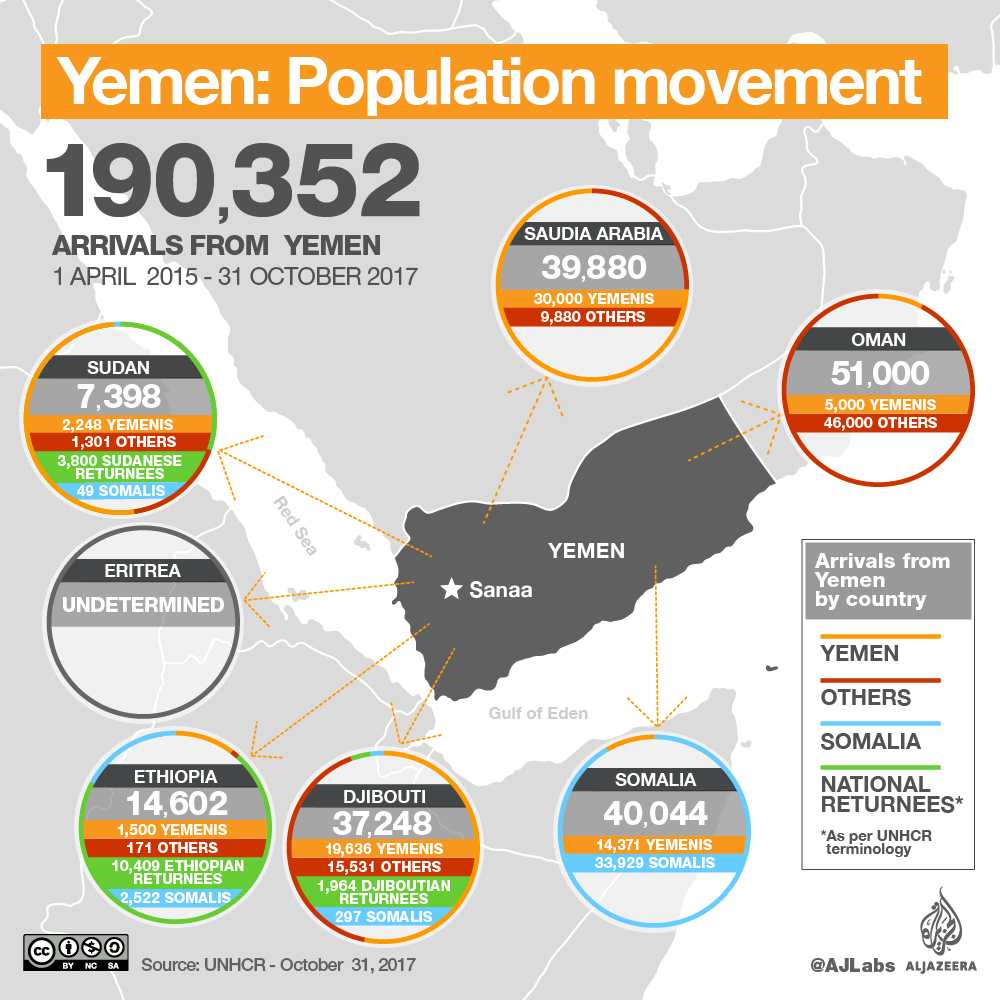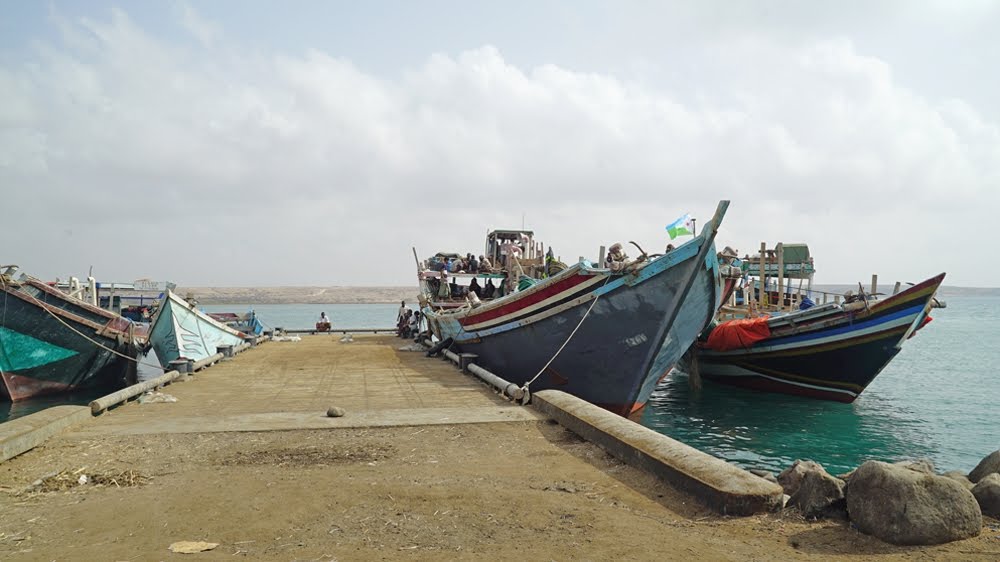A Yemeni’s harrowing journey through the ‘Gate of Tears’
By Faisal Edroos,
Al Jazeera, 14 Mar 2018
Crossing
the Gate of Tears

After
risking everything for a better life in Djibouti, Abdullah Muhammad says he may
have to return to war-torn Yemen.
 |
| Djibouti, a tiny nation of 800,000 people, is a haven for nearly 40,000 Yemenis who have fled air strikes that have devastated their country [Faisal Edroos/Al Jazeera] |
Obock,
Djibouti - With just the clothes on his back and $7 to his name, Abdullah
Muhammad says it's a "miracle" he managed to make it out of Yemen
alive.
Standing
in the blistering heat of a parched, dusty road in Obock, the holes in his
jeans and sweat dripping from his worn-out shirt are the only visible signs of
the gruelling seven-day journey he made to reach safety.
The
ferocious sandstorms that routinely ravage the small port town are a
welcome change from the gunfire and air strikes that decimated his hometown, he
says. But with his mind still preoccupied with the safety of the family and
friends he left behind, he's unsure of what to do next.
When
Yemeni ground forces backed by Saudi Arabia
encircled his village of Masraba in Taiz province, Muhammad's family
saw Djibouti
- an impoverished country that sits 100 kilometres west of Taiz - as the
only hope of saving their son from the clutches of the advancing troops.
"Someone
began spreading false information that I was a Houthi sympathiser, despite my well-known
secular views," Muhammad told Al Jazeera.
"When
I made a few posts on Facebook criticising exiled President Abd-Rabbu Mansour
Hadi they were mistaken for Houthi propaganda. Within a few days, I received
four death threats from pro-government trolls.
"My
parents, fearing I could be kidnapped or assassinated, told me to run - the
only safe place for me was abroad."
With his
parents fearing the worst, Muhammad's mother sold all the gold and
jewellery she possessed to pay for her son's journey westward.
Carrying
just a bottle of water, the $210 his mother gave him, and a
rucksack full of his prized possessions, the 28-year-old spent the next
six days walking back and forth across southern Yemen, trekking through barren
wastelands and deserts - cowering to the ground each time a Saudi F-15 fighter
jet roared overhead.
"I
went from Masraba to Aden but was turned back by pro-government forces,"
he said.
"The
situation was repeated in Mokha and Mandeb before I finally reached a fishing
port at Ras al-'Ara. I must have walked 300km in total; it was exhausting.
"I
think I was suffering from heat stroke, but what would await me was far
worse."
I've spent $3 over the last two days, all I have remaining is $7 - that won't last long. If I can't find work I'll have to risk it all again and head back home to Yemen.Abdullah Muhammad, 28-year-old Yemeni refugee
Once at
Ras al-Ara, Muhammad was introduced to a fisherman ferrying a family of
desperate Yemenis to Obock in northern Djibouti.
A tiny
nation of over 800,000 people, Djibouti has become a haven for Yemeni
refugees fleeing Saudi-led air strikes that have gripped the country since
March 2015.
Paying
the trafficker $200 to guarantee him safe passage, he says seven people were
loaded onto the overcrowded wooden boat.
Forced to
toss away his bag as it occupied too much space, Muhammad says he curled
himself into a small ball, with barely enough room on the 4.3-metre vessel to
stretch out his legs.
"In
total, there were nine of us on board - two men, five women, myself and the
captain. All of us except the captain began to recite passages from the Quran
once we hit rough seas."
The
captain gave Muhammad qat (a mild narcotic) to chew, saying it would make the
long journey bearable. But strong winds and waves lashed the boat around,
less than 10 minutes after it set sail.
"The
journey should have taken a few hours, but because the captain feared being
attacked by the Saudi coalition we took a longer route in. We were at sea for more
than a day. It was a frightening ordeal."
Tens of
thousands of Yemenis have fled on small rickety boats across the Bab al-Mandeb
Strait, known as the Gate of Tears - a name derived from the long history of
people perishing when trying to cross it - with at least 37,248 arriving in
Djibouti.
The
journey is not without risk, said Vanessa Panaligan, the UN's
media relations officer in Djibouti, with at least 500 deaths reported between
the start of the war and February 2018.
"There
were at least 160 arrivals in December and another 70 in January," she
told Al Jazeera.
"Prior
to that, we were accustomed to seeing only a few new families coming in every
month, but now we're seeing large numbers arriving, sadly a lot of them are
single mothers."
The risk
of coming under coalition fire has also increased, highlighted by an attack on a
boat carrying more than 150 people, including children, last March.
At least
42 people were killed when a US-built
Apache helicopter opened fire on a boat departing from Yemen's
western city of Hodeidah.
Saudi
Arabia refused to cooperate with the UN in an investigation into the
attack.

'Death
surrounds Yemenis'
The
conflict in Yemen, now entering its third year, has changed dramatically since
the assassination of former president and strongman, Ali Abdullah Saleh.
His death
in November opened a complicated new chapter in the conflict and a deeper
polarisation among the country's warring parties.
The Houthis,
who seized large parts of the country, including the capital, in late 2014,
intensified their campaign of intimidation and violence to instil fear into
anyone protesting their grip over northern Yemen.
A spike
in arrests, kidnappings and killings followed, with any dissenting voices being
accused of working with the Saudi-led coalition, which has been bombing Yemen
since March 2015.
Hemmed in
by the fighting, more than 18 million civilians are currently living under
Houthi control, with the remaining 30 percent of the population - 10 million
Yemenis - forced to live in areas contested by armed groups, including al-Qaeda
in the Arabian Peninsula (AQAP), the Islamic State of Iraq and the Levant (ISIL,
also known as ISIS), and militias backed by the UAE.
The
humanitarian situation has also taken a scarier turn, with at least 10 million
Yemenis - a number greater than the entire population of Sweden - requiring
immediate humanitarian assistance.
Radhya
Almutawakel, the chairperson of Mwatana, a Yemeni human rights organisation,
said normal life in Houthi-held areas had "vanished.
"Both
the Houthis and pro-government forces have been involved in serious violations,
including the recruitment of child soldiers, attacks against hospitals,
indiscriminately shelling civilian areas, and blocking the flow of humanitarian
aid," she told Al Jazeera.
"The
situation in Taiz is really dire, with death surrounding Yemenis."
"Anywhere
is better than here"
After
more than 24 hours at sea, and just a few minutes on dry land, Muhammad began
questioning whether there was any going back.
"I
breathed a sigh of relief, but I knew my problems were far from over," he
said.
Around
600,000 people, more than 60 percent of the country's population, live in and
around the capital, Djibouti city, but with unemployment hovering around 45
percent, close to 400,000 live in slums with minimal basic services, including
clean water.
Temperatures
also reach up to 50C (122F) during the summer months, and with little to no job
opportunities, many of the incoming refugees have decided to head
back home.
"The
first thing the police did is take my passport," Muhammad said.
"I've
received no assistance from either the local authority or UN agencies. I'm
living off the kindness of others, which can't last long."
With at
least 155,000 people food-insecure and successive years of drought damaging
pasture zones, most Djiboutians rely on food assistance and remittances from
abroad to survive.
"Once
I get my passport back I want to head somewhere else. Maybe Australia will take
me in," Muhammad said.
"I've
spent $3 over the last two days, all I have remaining is $7 - that won't last
long.
"If
I can't find work I'll have to risk it all again and head back home to
Yemen."


